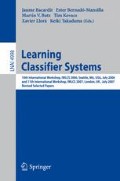Abstract
In this paper we promote a new methodology for designing LCS that is based on first identifying their underlying model and then using standard machine learning methods to train this model. This leads to a clear identification of the LCS model and makes explicit the assumptions made about the data, as well as promises advances in the theoretical understanding of LCS through transferring the understanding of the applied machine learning methods to LCS. Additionally, it allows us, for the first time, to give a formal and general, that is, representation-independent, definition of the optimal set of classifiers that LCS aim at finding. To demonstrate the feasibility of the proposed methodology we design a Bayesian LCS model by borrowing concepts from the related Mixtures-of-Experts model. The quality of a set of classifiers and consequently also the optimal set of classifiers is defined by the application of Bayesian model selection, which turns finding this set into a principled optimisation task. Using a simple Pittsburgh-style LCS, a set of preliminary experiments demonstrate the feasibility of this approach.
Access this chapter
Tax calculation will be finalised at checkout
Purchases are for personal use only
Preview
Unable to display preview. Download preview PDF.
References
Wilson, S.W.: Classifier Fitness Based on Accuracy. Evolutionary Computation 3(2), 149–175 (1995)
Butz, M.V., Pelikan, M.: Analyzing the Evolutionary Pressures in XCS. In: [23], pp. 935–942.
Butz, M.V., Goldberg, D.E., Tharakunnel, K.: Analysis and Improvement of Fitness Exploitation in XCS: Bounding Models, Tournament Selection and Bilateral Accuracy. Evolutionary Computation 11, 239–277 (2003)
Butz, M.V., Kovacs, T., Lanzi, P.L., Wilson, S.: Toward a Theory of Generalization and Learning in XCS. IEEE Transaction on Evolutionary Computation 8, 28–46 (2004)
Drugowitsch, J., Barry, A.M.: A Formal Framework for Reinforcement Learning with Function Approximation in Learning Classifier Systems. Technical Report 2006–02, University of Bath, U.K (January 2006)
Wilson, S.W.: Function Approximation with a Classifier System. In: [23], pp. 974–981.
Jacobs, R.A., Jordan, M.I., Nowlan, S., Hinton, G.E.: Adaptive mixtures of local experts. Neural Computation 3, 1–12 (1991)
Jordan, M.I., Jacobs, R.A.: Hierarchical mixtures of experts and the EM algorithm. Neural Computation 6, 181–214 (1994)
McCullach, P., Nelder, J.A.: Generalized Linear Models. Monographs on Statistics and Applied Probability. Chapman and Hall, Boca Raton (1983)
Drugowitsch, J., Barry, A.M.: Mixing Independent Classifiers. In: [24]
Bishop, C.M., Svensén, M.: Bayesian Hierarchical Mixtures of Experts. In: Proceedings of the 19th Annual Conference on Uncertainty in Artificial Intelligence (UAI 2003), pp. 57–64. Morgan Kaufmann, San Francisco (2003)
Brown, G., Kovacs, T., Marshall, J.: UCSPv: Principled Voting in UCS Rule Populations. In: [24], pp. 1774–1782.
Grünwald, P.D.: A tutorial introduction to the minimum description length. In: Grünwald, P., Myung, J., Pitt, M.A. (eds.) Advances in Minimum Description Length Theory and Applications. Information Processing Series, pp. 3–79. MIT Press, Cambridge (2005)
Vapnik, V.N.: An Overview of Statistical Learning Theory. IEEE Transactions on Neural Networks 10(5), 988–999 (1999)
Ueda, N., Ghahramani, Z.: Bayesian model search for mixture models based on optimizing variational bounds. Neural Networks 15, 1223–1241 (2002)
MacKay, D.J.C.: Bayesian interpolation. Neural Computation 4(3), 415–447 (1992)
Waterhouse, S., MacKay, D., Robinson, T.: Bayesian Methods for Mixtures of Experts. In: Touretzky, D.S.T., Mozer, M.C., Hasselmo, M.E. (eds.) Advances in Neural Information Processing Systems 8, pp. 351–357. MIT Press, Cambridge (1996)
Waterhouse, S.: Classification and Regression using Mixtures of Experts. PhD thesis, Department of Engineering, University of Cambridge (1997)
Bishop, C.M.: Pattern Recognition and Machine Learning. Information Science and Statistics. Springer, Heidelberg (2006)
Jaakkola, T.S.: Tutorial on variational approximation methods. In: Opper, M., Saad, D. (eds.) Advanced Mean Field Methods, pp. 129–160. MIT Press, Cambridge (2001)
Drugowitsch, J., Barry, A.M.: Generalised Mixtures of Experts, Independent Expert Training, and Learning Classifier Systems. Technical Report 2007–02, University of Bath, U.K (2007)
Chipman, H.A., George, E.I., McCulloch, R.E.: Bayesian CART Model Search. Journal of the American Statistical Association 93(443), 935–948 (1998)
Spector, L., Goodman, E.D., Wu, A., Langdon, W.B., Voigt, H.M., Gen, M., Sen, S., Dorigo, M., Pezeshk, S., Garzon, M.H., Burke, E. (eds.): GECCO-2001: Proceedings of the Genetic and Evolutionary Computation Conference. Morgan Kaufmann, San Francisco (2001)
Thierens, D., Beyer, H.G., Birattari, M., Bongard, J., Branke, J., Clark, J.A., Cliff, D., Congdon, C.B., Deb, K., Doerr, B., Kovacs, T., Kumar, S., Miller, J.F., Moore, J., Neumann, F., Pelikan, M., Poli, R., Sastry, K., Stanley, K.O., Stützle, T., Watson, R.A., Wegener, I. (eds.): GECCO-2007: Proceedings of the 9th Annual Conference on Genetic and Evolutionary Computation Conference 2007, vol. 2. ACM Press, New York (2007)
Author information
Authors and Affiliations
Editor information
Editors and Affiliations
Rights and permissions
Copyright information
© 2008 Springer-Verlag Berlin Heidelberg
About this paper
Cite this paper
Drugowitsch, J., Barry, A.M. (2008). A Principled Foundation for LCS. In: Bacardit, J., Bernadó-Mansilla, E., Butz, M.V., Kovacs, T., Llorà, X., Takadama, K. (eds) Learning Classifier Systems. IWLCS IWLCS 2006 2007. Lecture Notes in Computer Science(), vol 4998. Springer, Berlin, Heidelberg. https://doi.org/10.1007/978-3-540-88138-4_5
Download citation
DOI: https://doi.org/10.1007/978-3-540-88138-4_5
Publisher Name: Springer, Berlin, Heidelberg
Print ISBN: 978-3-540-88137-7
Online ISBN: 978-3-540-88138-4
eBook Packages: Computer ScienceComputer Science (R0)

